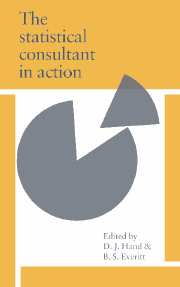Book contents
- Frontmatter
- Contents
- Preface
- List of contributors
- 1 Statistical consultancy
- 2 Consultants' cameos: a chapter of encounters
- 3 Straight consulting
- 4 A two-period crossover trial
- 5 Consultancy in a medical school, illustrated by a clinical trial for treatment of primary biliary cirrhosis
- 6 The analysis of response latencies
- 7 Acid rain and tree roots: an analysis of an experiment
- 8 On identifying yeasts and related problems
- 9 Uneven sex ratios in the light-brown apple moth: a problem in outlier allocation
- 10 Collaboration between university and industry
- 11 Inspection for faulty components before or after assembly of manufactured items
- 12 Statistical modelling of the EEC Labour Force Survey: a project history
- Bibliography on statistical consulting
- Name index
- Subject index
6 - The analysis of response latencies
Published online by Cambridge University Press: 05 June 2012
- Frontmatter
- Contents
- Preface
- List of contributors
- 1 Statistical consultancy
- 2 Consultants' cameos: a chapter of encounters
- 3 Straight consulting
- 4 A two-period crossover trial
- 5 Consultancy in a medical school, illustrated by a clinical trial for treatment of primary biliary cirrhosis
- 6 The analysis of response latencies
- 7 Acid rain and tree roots: an analysis of an experiment
- 8 On identifying yeasts and related problems
- 9 Uneven sex ratios in the light-brown apple moth: a problem in outlier allocation
- 10 Collaboration between university and industry
- 11 Inspection for faulty components before or after assembly of manufactured items
- 12 Statistical modelling of the EEC Labour Force Survey: a project history
- Bibliography on statistical consulting
- Name index
- Subject index
Summary
Introduction
As a statistical consultant and teacher in a multi-disciplinary research establishment such as the Institute of Psychiatry one is faced with many types of statistical problem. One also has to learn to cope with a wide range of statistical abilities and/or experience in the clients. Not only may the client not have any proficiency in the use of statistics and computers, but there are also wide variations in the overall approach to research in the different disciplines. Anthropologists, psychiatrists, psychologists and biochemists have very different views about the role of research and the way it should be carried out. Clearly a statistical consultant has an obligation to provide advice about good experimental or survey design together with a description and explanation of the appropriate methods of analysis. Perhaps the exact nature of the advice will depend on the background of the client and the context in which the client is carrying out the research. But, if the consultation is taking place in an academic setting, such as a postgraduate medical school, what else should be provided? Should one expect the client to learn to use a computer and carry out the analysis? Yes. Ideally, I think that the consultant statistician should be regarded as a teacher rather than as a ‘boffin’ to be used to help generate the right answers. Given this view, should the analysis be kept simple (but perhaps not as ‘perfect’ as it might have been if carried out by the expert) or should it be relatively sophisticated?
- Type
- Chapter
- Information
- The Statistical Consultant in Action , pp. 72 - 79Publisher: Cambridge University PressPrint publication year: 1987
- 1
- Cited by



